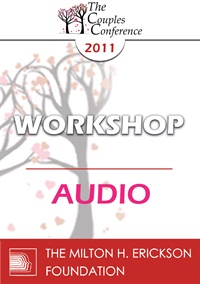
- Average Rating:
- Not yet rated
- Topic Areas:
- Workshops | Panic | Addiction | Pain and Healing | Sex and Sexuality | Couples Therapy
- Categories:
- Couples Conference | Couples Conference 2011
- Faculty:
- Marty Klein, PhD
- Duration:
- 1:56:37
- Format:
- Audio Only
- Original Program Date:
- Apr 01, 2011
- Short Description:
- This talk presents: 1) current information about porn, its users, and its impact on consumers and their relationships; 2) the common model of how porn use shapes sexual decision-making, and an alternative model that better matches people’s experiences; 3) an alternative to the “porn addiction” model for diagnosing and treating compulsive or impulsive behavior regarding porn.
- Price:
- $15.00 - Base Price
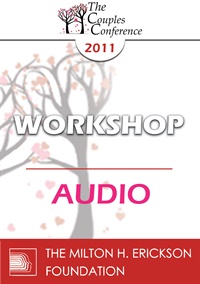
- Average Rating:
- Not yet rated
- Topic Areas:
- Infidelity | Workshops | Affairs | Couples Therapy | Intimacy | Relationships | Marriage | Multicultural
- Categories:
- Couples Conference | Couples Conference 2011
- Faculty:
- Esther Perel, MA, LMFT
- Duration:
- 1:30:32
- Format:
- Audio Only
- Original Program Date:
- Apr 01, 2011
- Short Description:
- Infidelity generally points out flaws in a relationship, and the revelation of an affair often triggers a crisis of trust and connection. We’ll examine the benefits and the costs of truth-telling and transparency, how couples can rebuild trust and intimacy, and how affairs can actually stabilize a marriage and prevent its dissolution. In particular, we will focus on how couples can turn the crisis into an opportunity. Combining didactic material, case studies and video vignettes, we will lay out a nuanced and multicultural therapeutic approach for working with extramarital relations, fantasized or real, disclosed or shrouded in secrecy.
- Price:
- $15.00 - Base Price
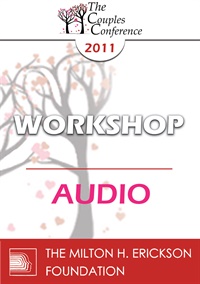
- Average Rating:
- Not yet rated
- Topic Areas:
- Couples Therapy | Workshops | Motivation | Neurobiology | Therapist Development
- Categories:
- Couples Conference | Couples Conference 2011
- Faculty:
- Jette Simon
- Duration:
- 1:41:46
- Format:
- Audio Only
- Original Program Date:
- Apr 01, 2011
- Short Description:
- Knowing how to elicit positive emotion even in couples steeped in intensely negative interactions is the key to providing the motivation for change. In this workshop, we’ll explore a variety of ways for creating “magical moments” in the therapy hour that offer a new template for couples, otherwise trapped in dysfunction, to allay repetitive cycles. You’ll learn how to use tools like focusing, sentence stems, doubling and directives to invite couples into new kinds of experience of connection. We’ll also examine the neurobiological principles that enable partners to expect and attract more positive experiences from each other.
- Price:
- $15.00 - Base Price
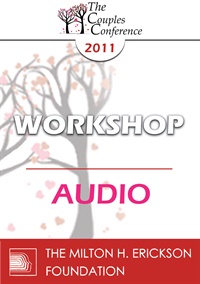
- Average Rating:
- Not yet rated
- Topic Areas:
- Workshops | Conflict | Couples Therapy | Pain and Healing | Relationships
- Categories:
- Couples Conference | Couples Conference 2011
- Faculty:
- Julie Gottman, PhD
- Duration:
- 1:38:30
- Format:
- Audio Only
- Original Program Date:
- Apr 02, 2011
- Short Description:
- Couples’ conflicts that hurt and go unprocessed often lead to chasms of emotional distance. This workshop explains and demonstrates with film how a couple can learn to process their own battles and move from resentment to understanding, accountability, and repair. The Gottman “Recovery Kit” will be explained and given to each participant.
- Price:
- $15.00 - Base Price
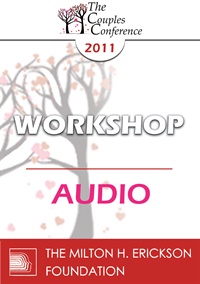
- Average Rating:
- Not yet rated
- Topic Areas:
- Workshops | Couples Therapy | Family Therapy | Marriage
- Categories:
- Couples Conference | Couples Conference 2011
- Faculty:
- William Doherty, PhD
- Duration:
- 1:56:46
- Format:
- Audio Only
- Original Program Date:
- Apr 02, 2011
- Short Description:
- Remarried couples are often poorly served by therapists who treat them without enough appreciation for the unique complexity and multiple loyalties of stepfamily life. This workshop will combine clinical assessment and treatment issues with a special focus on values issues such as commitment and fairness that often dominate conflict in stepfamilies.
- Price:
- $15.00 - Base Price
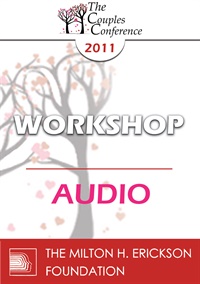
- Average Rating:
- Not yet rated
- Topic Areas:
- Sex and Sexuality | Workshops | Couples Therapy
- Categories:
- Couples Conference | Couples Conference 2011
- Faculty:
- Marty Klein, PhD
- Duration:
- 2:03:09
- Format:
- Audio Only
- Original Program Date:
- Apr 02, 2011
- Short Description:
- How do we raise sexual issues? How should we respond when the couple does? Why doesn’t THIS couple enjoy sex, or have sex? Are aging or health issues complicating sexual problems? What’s the ONE cross-cultural issue that matters regarding sexuality? And what’s really a sexual issue—versus an issue of power, grief, resentment, or fear of rejection/abandonment? This PRACTICAL workshop will give you skills you can use on Monday morning.
- Price:
- $15.00 - Base Price
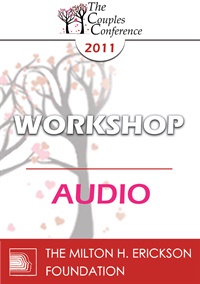
- Average Rating:
- Not yet rated
- Topic Areas:
- Workshops | Anger | Couples Therapy | Intimacy | Passive-Aggressiveness
- Categories:
- Couples Conference | Couples Conference 2011
- Faculty:
- Ellyn Bader, PhD
- Duration:
- 1:09:17
- Format:
- Audio Only
- Original Program Date:
- Apr 02, 2011
- Short Description:
- Overtly angry and passive-aggressive partners often present the most difficulty for therapists. They frequently demand intimacy, while being unable to create the conditions for intimacy to occur or be sustained. They require a high level of activity from you to structure treatment, manage hostility in the office and confront hypocrisies that keep their development stalled. Learn to increase your personal strengths to harness the enormous developmental potential that exists in these couples.
- Price:
- $15.00 - Base Price
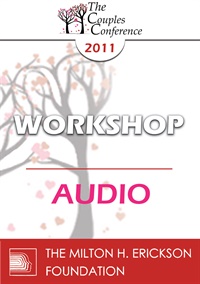
- Average Rating:
- Not yet rated
- Topic Areas:
- Sex and Sexuality | Workshops | Intimacy | Couples Therapy
- Categories:
- Couples Conference | Couples Conference 2011
- Faculty:
- Esther Perel, MA, LMFT
- Duration:
- 1:26:34
- Format:
- Audio Only
- Original Program Date:
- Apr 02, 2011
- Short Description:
- This workshop probes the intricacies of love and desire—how they relate and how they conflict.. Participants will learn how emotional intimacy can inhibit sexual desire and why “good intimacy” doesn’t necessarily make for “good sex.” Through case material and video vignettes, we’ll explore how our emotional history: “how we were loved” shapes our erotic blueprints and expresses itself in the physicality of sex: “how we make love”. We will show how to break through erotic impasses and help couples balance the dual needs for security and freedom. This model applies to couples and individuals from all sexual orientations.
- Price:
- $15.00 - Base Price
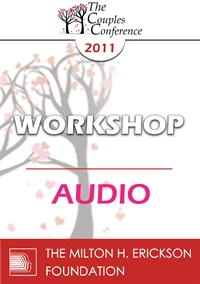
- Average Rating:
- Not yet rated
- Topic Areas:
- Workshops | Communication | Love | Couples Therapy | Family Systems
- Categories:
- Couples Conference | Couples Conference 2011
- Faculty:
- Richard Schwartz, PhD
- Duration:
- 1:57:57
- Format:
- Audio Only
- Original Program Date:
- Apr 02, 2011
- Short Description:
- This workshop is designed to help you and your partner learn how to achieve courageous love, based on the presenter’s Internal Family Systems model of psychotherapy. When couples have self-led conversations, their relationships harmonize naturally. They can discuss even highly charged issues productively and feel safe to reveal their most vulnerable parts to each other.
- Price:
- $15.00 - Base Price
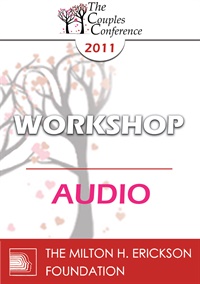
- Average Rating:
- Not yet rated
- Topic Areas:
- Couples Therapy | Post-Traumatic Stress Disorder (PTSD) | Trauma | Workshops | Sex and Sexuality | Gottman Method
- Categories:
- Couples Conference | Couples Conference 2011
- Faculty:
- Julie Gottman, PhD
- Duration:
- 1 Hour 42 Minutes
- Format:
- Audio Only
- Original Program Date:
- Apr 01, 2011
- Short Description:
- Couples therapy is often complicated and delicate when one partner has suffered childhood sexual abuse. The needs of both partners must be honored though one partner’s dream may be the other partner’s nightmare. This workshop describes the details of applying Gottman Method Couples Therapy to a case involving one partner’s history of severe sexual abuse.
- Price:
- $20.00 - Base Price
Please wait ...

